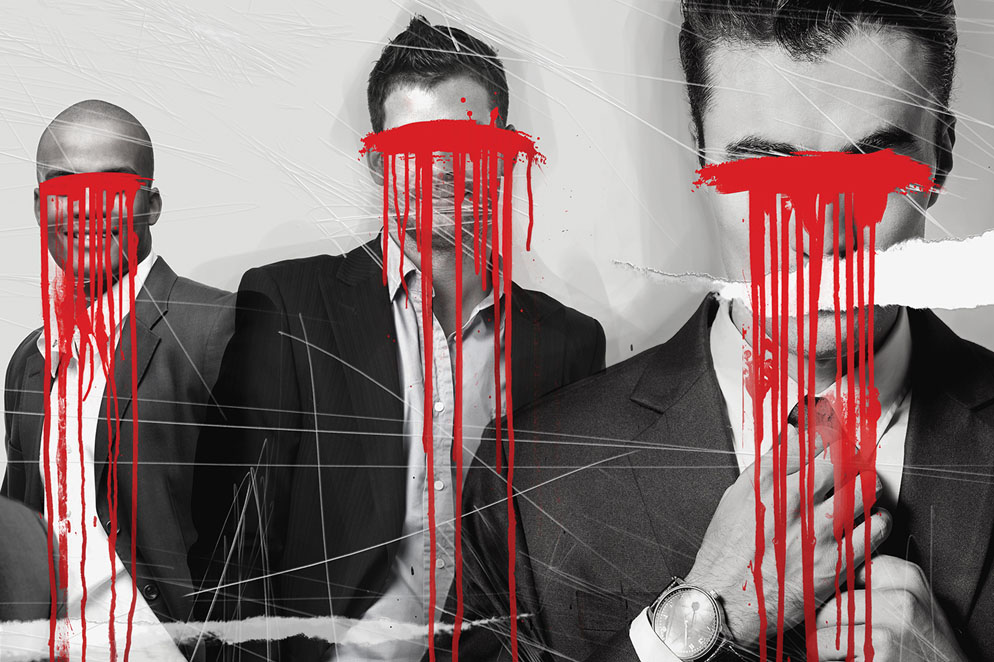
Chris Goode and Company’s avowed intent ‘is to make space for unheard voices’ and ‘to think out loud about who we all are in the hope we might catch a glimpse of how we might live better together’. These are admirable aspirations, but I am not at all sure that Men In The Cities fulfils them.
Chris Goode has gained a well-deserved reputation for experimental theatre, and is perhaps best known for Monkey Bars, an innovative verbatim show developed from candid conversations with young children but performed by an adult cast and set in adult situations. Offering a fresh and compassionate insight into the hopes and fears of children, Monkey Bars won a Fringe First Award in Edinburgh in 2012 and went on to further success in London. Men In The Cities is a one-man show written and performed by Goode, and is most decidedly very different fare.
Lit by a single light he stands alone, while upstage there are black speakers and various types of electric fan which occasionally turn on and off, singly or together. He takes us back to the early morning of 23rd May, 2013, the day after soldier Lee Rigby was murdered by Michael Adebolajo and Michael Adebowale in Woolwich. In the darkness there is the scream of a mating vixen, while a man wakes from a nightmare in which he is crushing his baby son’s head, though the dream fades before he can recall it.
Elsewhere a young boy called Rufus is blissfully absorbed by the gay pornography on his phone and is reluctant to abandon it in order to go downstairs to open his birthday presents. A gay man kisses his partner goodbye before setting off for work, leaving him to kill himself by downing a carefully laid out row of painkillers one by one. What follows is an utterly bleak vision of a fractured Britain populated by lonely, damaged men. At one point a man old enough to have done National Service reflects that these days we no longer hear words like ‘gallant’, ‘valour’ or ‘steed’. Goode seems to be mourning the demise of positive role models for men, and instead we are left with a terrorist with bloodied hands condemning the society that produced him. There are some moments of mordant humour, but Goode lets very little light break through all this anger and despair. By the end of the tale only 10-year-old Rufus has found any kind of happiness, and even he hates the bike he was given for his birthday.
Among the many characters that Goode portrays there are certainly some who represent ‘unheard voices’, but their stories are too fragmented for us to develop real empathy for them, and in the all-pervading pessimism it is hard to detect even the briefest flicker of hope for a better future. Goode is a talented storyteller and Men In The Cities cannot be said to lack ambition. What is not clear is precisely where its ambitions lie.
It is forthright in its graphic depictions of gay sex and certainly provocative in its use of the murder of Lee Rigby as a metaphor for a society full of alienated, angry, lost men. But Goode’s negativity is so relentless and all-embracing than one becomes weary of struggling to find a meaning in the darkness. In one sequence the doomed flight of MH370, Woody Allen’s dubious relationship with his seven-year-old daughter and the suicide of Philip Seymour Hoffman are all referenced in a near incoherent rant that seems to have too many targets to have any real aim. In the final minutes a man undergoes a kind of Damascene revelation in which he recognizes his responsibility for the death of his gay son. In a whirling, hyperbolic tirade of desperate self-loathing he cries out for pain and punishment. I felt I should care, but in truth I just wanted it to stop. And I never really understood the purpose or meaning of the electric fans. Disappointing. ★★☆☆☆ Mike Whitton 14th November 2015

